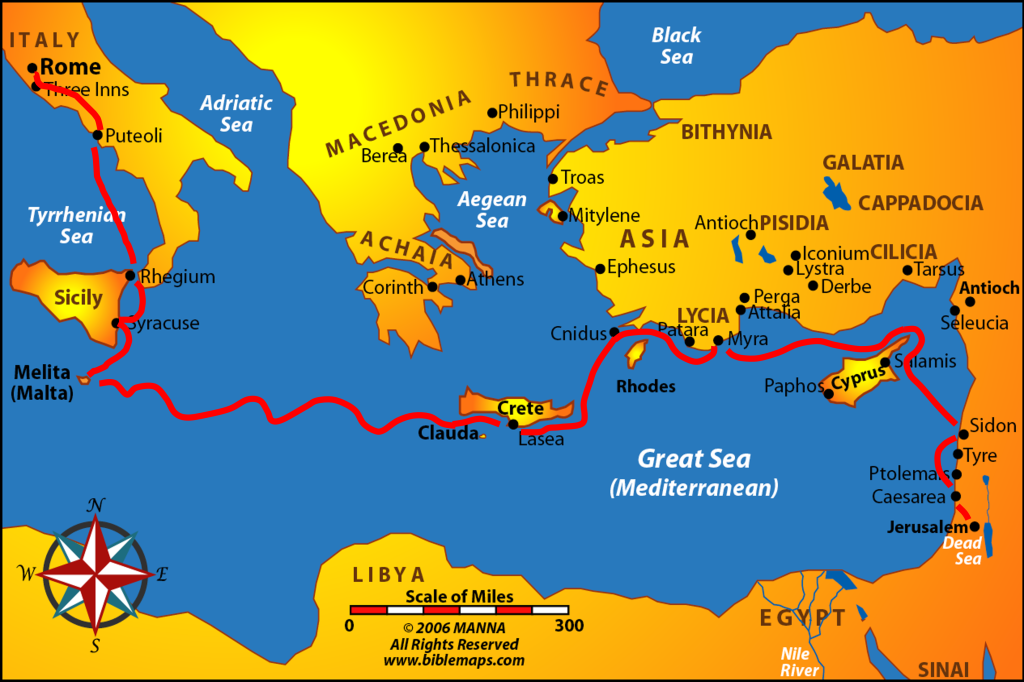| Note | Date | Event | Reference(s) |
| ad. | Jerusalem | Acts 21:17 – 23:30 | |
| ae. | AD 57 – 59 | Caesarea | Acts 23:31 – 26:32 |
| af. | Summer AD 59 – February AD 60 | Caesarea – Sidon – Myra – Malta – Syracuse (Sicily) – Rhegium (Reggio di Calabria, Italy) – Puteoli (Pozzuoli, in the Bay of Naples) – Rome | Acts 27:1 – 28:16 |
| ag. | February AD 60 – 62 | Rome | Acts 28:17-31 |

ad. In Jerusalem, Paul and those who accompanied him, representing as they did the increasingly multi-cultural composition of the church, were welcomed by the believers, now clearly led by James. The Jews began to stir up trouble and falsely accused him of teaching against the law and defiling the temple by bringing Gentiles into the inner courts. The riot that ensued in the temple area drew the attention of the Roman tribune and Paul was arrested and on the following day brought before the Sanhedrin.
ae. After learning of a plot to assassinate Paul, he was sent by night to Caesarea, guarded by 470 military personnel, and there he was tried by Felix, the governor. Despite finding no reason to convict Paul, Felix is unwilling to release him; partly because he was hoping for a bribe, and partly because he didn’t want to fall out of favour with the Jews. Paul is committed to a relatively relaxed form of imprisonment, a situation which is to last for two years.
Festus, Felix’s successor, examined Paul, and, wishing to curry favour with the Sanhedrin, suggests a trial in Jerusalem. Paul, claiming his right as a Roman citizen, requested that he be heard by Caesar’s tribunal in Rome (Acts 25:10). After hearing Paul’s defence, King Agrippa II ordered Paul to be escorted to Rome for a final decision. Sometime after Paul’s request and Festus’ decision, and while Paul is still imprisoned in Caesarea, King Agrippa II and his sister, Bernice, pay Festus a visit. Festus affirms that Paul has done nothing worthy of trial and conviction and, had he not appealed to Caesar, Paul could have been released.
af. Paul, along with Luke and other prisoners, set sail from Caesarea, probably in the late summer or early autumn of AD 59. They sailed north to Sidon and then along the southern coast of Asia Minor to Myra. Here they transferred to another ship which was bound for Italy and set sail for Crete. Arriving off Crete they took shelter from the strong winds in the small bay called Fair Havens. By this time “the Fast” (i.e. Yom Kippur, the Day of Atonement, i.e. October 5, AD 59) was past, winter was fast approaching, and it was a dangerous time to be traveling on the Mediterranean. Paul counsels that they spend the winter in Fair Havens rather than risk the open seas, but his advice is ignored by the ship’s owner and the pilot and they made for Phoenix which was a better protected harbour on Crete.
The strong winds caught the ship and they had to take safety measures, including throwing their cargo overboard, and all in all they spend fourteen days adrift at the mercy of the storm. They finally approached the island of Malta, but the ship ran aground on a reef and was broken up by the pounding waves. Initially the Roman soldiers plan to kill all the prisoners to prevent their escaping, but the centurion forbids it and, in fulfilment of a prophecy through Paul, everyone reaches land safely.
The name Melita was first given to the island we know as Malta by Phoenician sailors, it being a Canaanite word meaning shelter. Paul and others who were on board are given hospitality by Publius, the “chief man” of the island.
After wintering there (November AD 59 – January AD 60), they secured passage on an Alexandrian ship headed for Rome, stopping along the way at Syracuse (Sicily) and Rhegium (Reggio di Calabria, Italy), and finally disembarking at Puteoli (Pozzuoli, in the Bay of Naples), the main port in southern Italy, where they were able to spend a week with the local community of Christians. From Puteoli they travelled by land up to Rome, being met by “brothers” some 45 miles out of the city at the Forum of Appius, and by more, 10 miles further along the road at The Three Taverns. They would have finally arrived in late February of AD 60.
ag. In Rome, Paul was placed under a form of house arrest, supervised by a member of the Praetorian Guard. During this first Roman imprisonment which lasted two years (AD 60 – AD 62) (Acts 28:30), Paul wrote the Prison Letters of Ephesians, Philippians, Colossians and Philemon.